The Partnership: From The Boards To The Soundstage, Fantasia Barrino And Danielle Brooks Have Formed A Bond In ‘The Color Purple’
- Oops!Something went wrong.Please try again later.
- Oops!Something went wrong.Please try again later.
- Oops!Something went wrong.Please try again later.
- Oops!Something went wrong.Please try again later.
- Oops!Something went wrong.Please try again later.

The sisterhood between Fantasia Barrino and Danielle Brooks began on Broadway. That is, the sisterhood of the order of The Color Purple. Both women starred on stage in the musical adaptation of Alice Walker’s 1982 Pulitzer-prize winning novel. Barrino spent 10 months in 2007 playing Celie, the poor country girl who survives an abusive step-father and husband and realizes her worth.
Brooks spent a year in the 2015 revival as the defiant Sofia, opposite Cynthia Erivo as Celie. Now filmmaker Blitz Bazawule places them in the exact same parts in his blockbuster musical movie version, starring Taraji P. Henson, Colman Domingo and Corey Hawkins, with Oprah Winfrey — who was Oscar-nominated for her Sofia in Steven Spielberg’s 1985 film version — producing. Barrino and Brooks tell Baz Bamigboye the story of how they came to their roles and what the journey has meant to them both.
More from Deadline
DEADLINE: You’ve both dug so deep into your roles and there’s something about your performances that wholly anchors the film. How did you both do that?
DANIELLE BROOKS: For me, I truly called on ancestors, and I called the work that I feel I had to do, blood work. It’s really spirit work. It’s taking time and really listening to these Black women who want to come to you and talk to you from the past and share their stories. I really felt that way. I would have pictures of Black women that I felt like were Sofias in my dressing room, like Fannie Lou Hamer. And I would read stories about Black women who were home, like Eliza Woods during that time, and just really sit with them to see what they needed from me. And I feel like what they needed was for people to understand the humanity of who they are, that they aren’t angry Black women, the Sofias of the world, they are survivors. They are women trying to make it, trying to break generational curses.
They are trying to make sure that the women or little girls that come behind them aren’t subjected to the same thing that they were. And that’s what I tried to embody. And at the same time, Alice Walker, the words that she wrote, I carried, and still to this day in this hotel room, whether it’s weird or not, I carry The Color Purple with me, the book, because there’s just so much in there when they talk about…
Even her name, Sofia, meaning wisdom, and reading about when she calls her an Amazon woman, what that means. And when Celie in the book says, “Harper don’t want a wife, he want a dog.” What does that mean? I just love dissecting her words and finding ways to infuse that into the work. But also, at the end of the day, you can’t act by yourself, so having incredible scene partners like Fantasia, when we are in that jail scene… I could try to do that by myself, but it’s really what she gave me through that monologue, and the way she delivered, and speaking about her children and telling her about what Harpo’s doing and bringing her the food and bringing her the sweater.
Those are the things that add to my character and what I bring to it. So yeah, the phenomenal cast that is Fantasia and Corey [Hawkins], and our Mister, Colman [Domingo], and Taraji [P. Henson] as well, that’s what enhances this too.

DEADLINE: Yeah, very much so. And what about you, Fantasia? Because you dug deep too.
FANTASIA BARRINO: I was able to live with Celie. I did not get to read the book, but I would always watch the movie. And being honest, for me, the movie was, I would always want to hear Shug Avery [played by Margaret Avery in the 1985 Steven Spielberg movie] sing “God Is Trying To Tell You Something.” And just knowing that Celie was so much like myself, this is why I didn’t want to go back to playing Celie again after Broadway, I went back to talk to the young Fantasia. And to be honest with you, I had just started doing therapy. And what I was doing is what we call traumatic therapy. And I had to stop my therapist. I had to stop my sessions and she would text me and say, “Are you sure?” And I said, “I’m positive. I can’t do them right now, just because I need her, Celie to have more conversations than I have with you.”
I also pulled from my grandmother who’s gone home to be with the Lord. She was our living Celie. I also pulled from situations that I saw my mother go through with my father. Those were things that I had suppressed, and my therapist was trying to dig down and help me bring back up, because it’s very important not to suppress them, but actually heal and be free from them. So through playing Celie this time, I keep saying I was healed. And I think people want to know like, well, wait, we thought you were married, you look happy, you look good. But to dig deeper, that is what I’m talking about. I had to go back and talk to young Fantasia.
I had to remember things about my grandmother, which was heavy because my grandmother was my number one fan. When the world had turned against me and everything about Fantasia was bad press, bad this, bad that. “She’s illiterate, she won’t be this. She broke, she’s da, da, da,” my grandmother was the one that was always investing in me. And so to lose that and still be here, and not having that phone call or being able to… So I have to keep her so dear. And to go back and think about things that my mom dealt with that I was very angry with her about. These are conversations I would have with her when I would come off set. My mother came with me, my whole entire family came with me. I couldn’t have done it without them. Everybody moved to Atlanta. And so when Blitz says Fantasia keeps saying through the movie, she was healed, that’s what I’m talking about. Yes, I’m married and I’m happy now, but traumatic therapy is going back and dealing with the things that you didn’t even know you had pushed down. And so through Celie, I stopped therapy, and she was my therapy.
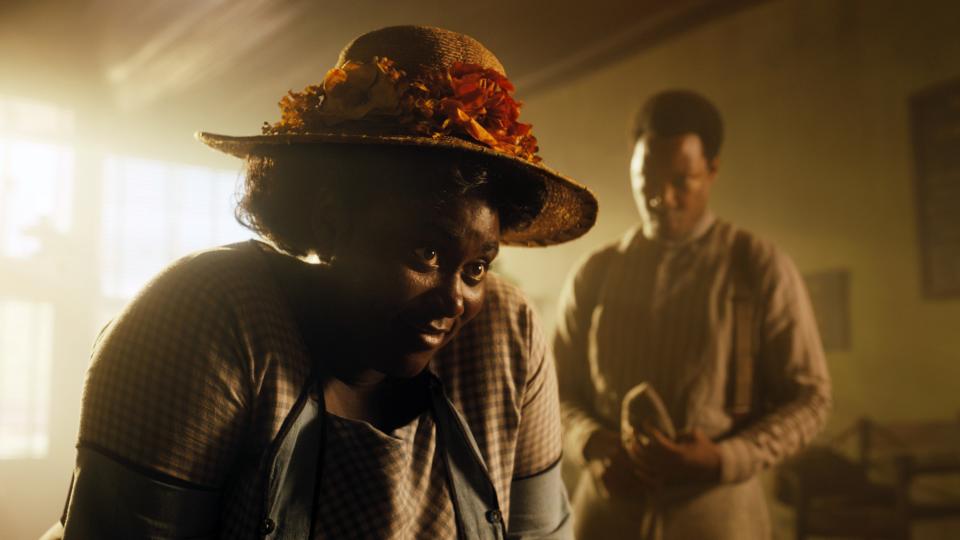
DEADLINE: My family’s from Nigeria, and I have, or had, many, many aunts. And I had one aunt very much like Celie, and another very much like Sofia. I think it’s because Alice Walker did a lot of research in West Africa. The women of West Africa, Ghana and Nigeria, they have a sort of inner strength. And I think both of you have kind of picked that vibe up, somehow.
BROOKS: Because we’re all connected, you know how we got over here? It’s a part of who we are. It’s a part of our culture, even across seas, that has never left us, that part, Africa, our people. It’s who we are. And so, I’m so glad that you say that you see your people, Nigerian folk, in these African American women. And I hope that’s the case for other people as well. I pray that white people can see themselves in this. Because I’m sure they got some Sofias and Celies.
DEADLINE: Oh, yes.
BROOKS: So I’m hoping that they can find themselves in these stories too, because we all at the end of the day, are dealing with trauma, and hurt, and pain, and that’s the only way you’re going to get through life. Can’t nobody walk through life just happy, jolly and OK. So being that that’s the core of our story here, I feel anyone who has a heartbeat will understand and see themselves in somebody.
DEADLINE: Do you have that African vibe in you?
BROOKS: Oh, it’s in me. It is. I just finally did ancestry work with Henry Louis Gates a few months ago, and that won’t air until mid-February. But I did find out that I am Nigerian, which is very exciting.
DEADLINE: Welcome. Welcome to the tribe.
BROOKS: Thank you so much. I’m very excited to learn more. Unfortunately, because it hasn’t aired yet, I’m not able to talk too much in detail about the tribe and all of that. But I’m excited about learning more about who I am, more in depth. And yeah, Nigerian people are so special. I feel like they just don’t take no for an answer, and some of the most hardest working people I’ve ever seen [laughs]. And I think about Cynthia [Erivo] and Uzo Aduba [her co-star in Orange Is the New Black] and a few of my other friends, what’s my girl’s name? Yvonne Orji. They worked super hard. And so it makes sense that I would be Nigerian. I work and work.
DEADLINE: And do you know very much about your ancestry, Fantasia?
BARRINO: I do. And I’m learning a lot. My father, my last name is Barrino, but they would say it “Battarino.” They were Sicilian. And my grandmother was biracial, her father was white on my mother’s side. So I have a little bit of everything going on in me right now, and we’re still digging even deeper. And I share with my family that I don’t want us all to grow and not know who we truly are. I’m the first one to step out and start finding out information, and not allowing my uncles and aunties who have been here forever and haven’t done any research, I’m the one that’s breaking that thing and letting them know like, “Hey, do you know who you truly are, and what lies within you?” We are Sicilian, Black, got a little bit of Indian, a little bit of everything inside of us.
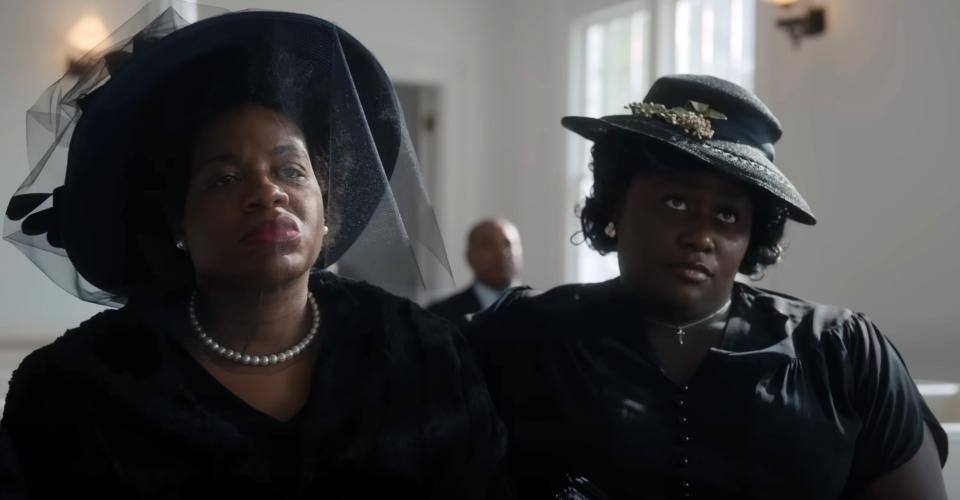
DEADLINE: And please give me a sense of what growing up in those small Southern towns taught you? Because I see you as people with strength and purpose, and I’m just curious to know what those towns instilled in you both.
BARRINO: For me, I’m going to say it’s that humbleness of when you’re in a small town, everybody knows everybody. Everybody takes care of everybody, and everybody just keeps it real. And so for me, that is something that I have chosen to make sure I don’t lose in an industry that’s moving so fast and everybody’s chasing after something. I’ve decided that when I was in High Point and I was just a young little girl singing. I’ve been singing before I was getting paid for it. I was singing before they gave me any accolades, I would sing for free. So that mentality for me is I want to keep that. I do it because God gave me a gift. This is my ministry, and I just love it. And there was a time in my life when I didn’t love it anymore. And this is my very first movie, so I can only go on the music.
It’s been 20 years for me in that area. And there was a time when I didn’t love it anymore, because I saw myself beginning to chase something that did not look like me or did not look like the small town that I came from. So I had to fall back, go back. I still live in Charlotte, North Carolina. I am there for a reason, because after I get away from all of this, and all the lights, and all the glitz and all the glamor, I’m able to go home and say, “But this is me and this is who I am.” So this time around, I’m not going to let that go. I’m from High Point, North Carolina. I talk like this, I walk like this, and I ain’t going to change it.
BROOKS: I love what she says too. It’s true. I think she hit the nail on the head. I mean, it is about humbleness, and that is what I take as well from my community. Also, where we’re both from, I believe, if I can speak on your behalf, to Fantasia, our communities in our small towns are surrounded by so many churches. And what that gave me was a foundation of faith and service. That’s why I love what Fantasia is saying about we never really got into this for the fame, we did it because we loved it. And I think that’s what our communities really taught us. It is about service. It’s about sharing your gift with somebody else so that they can find their purpose or feel like they can move forward in life.
And to add to that, my community, yes, it was a small town, but it also had so many arts educational programs, which to me just blows my mind, because it’s not like a New York or LA where you’re just expecting that. But I don’t know, I just got blessed to live in a town that had those programs, and that really helped me to find out more about this art form.
I ended up going to a high school where I lived on campus that was structured like a mini-Julliard, and you had to audition to get in, and all of these things. And so that helped me to get to the big city and get to what my heart really loved before knowing that there was a possibility for me in TV and film, was theater. That is all I wanted to do, was act in theater. So I really do credit and thank my hometown, my church community, for being that foundation to sustain me in such a crazy industry where everybody is so focused on the climb and the money, and the being seen of it all.
There was one other thing I wanted to add to that. Also like Fantasia, I went back home to the South after living in New York for over 16 years. I now live in Georgia. And that is also the same thing, it is that reminder to not lose yourself and to know what’s important in life, which is family.
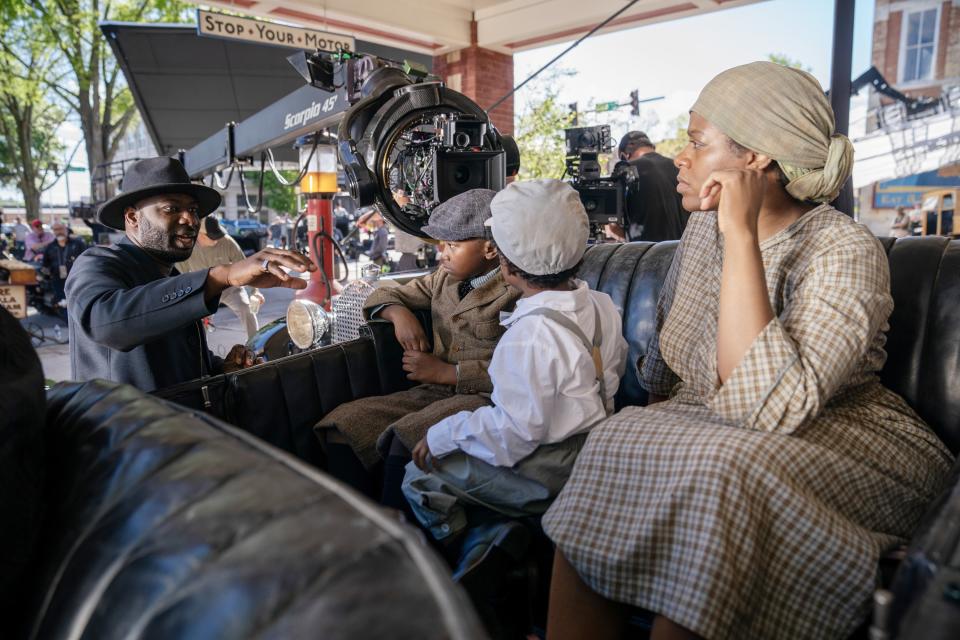
DEADLINE: Fantasia, watching the video of your first audition for American Idol, I was struck by how you stood there and sang unaccompanied in front of those three judges without seeming nervous. You just sang acapella. And I thought, ‘Oh my Jesus Christ. Where did she get that from?’
BARRINO: [Laughs]. Oh, I was nervous.
DEADLINE: You hid it well.
BARRINO: You know what it was, since we have started off by speaking on Danielle and I being from the Carolinas, you don’t see a lot of people from the Carolinas out here [in Hollywood]. I think me and Danielle, there was something, and you tell me if I’m wrong, D, I think there was something inside of us that said, yes, I’m a Carolina girl. Yes, I’m in the big city and I belong here, and I’m going to sing for all those girls and all those boys that are sitting back in our towns wondering, can I do this? Can it happen? I’m going to stand for them. And when I opened my mouth, I knew that was my only chance.
And you have to understand, on Idol there were so many auditions, you don’t just make it to Simon [Cowell], Paula [Abdul] and Randy [Jackson], on the first one. There were several. That first audition, I almost didn’t make it in. When we got there, they had closed the doors. And there was a man that I always speak about that I feel like was an angel. He took a liking to me and my brother the day before the auditions and was talking to us. He was the man that got me back in the building, so I made it to that audition. That was like, come on. I wasn’t supposed to even be in the room. I was the last person to audition, and there were thousands of people there that could sang.
Then you go back, you have to audition in front of somebody else. The third time you go with Randy, Paula and Simon, then you go to LA and there’s still about 15 more auditions before you make it to top 12. So for me, I’m not even going to necessarily say it was a point to prove, I just wanted to represent all those who are from small towns, or all those who feel like, I got a gift, but can I stand up against certain people? I always tell people I don’t read music. I come from a family of singers. So when I do award shows and I speak to the [music director]. They call me and say, “What key you want in?” I sing it. And I always say, “I’m sorry, I don’t read music.” And they said, “Stop saying you’re sorry and realize that you got a gift and he gave it. You can hear it.”
For me, we didn’t have the schools like Dani [Brooks] had. I didn’t have the ability to do that because it was four of us, and my parents were trying to keep food on the table and a roof over our head, and shoes on our feet. So it was almost like a fight for me to say, “I’m here. I may not have the clothes, I may not have the education, and I may not have certain things that you have. And I want people to know that either way you can do it.” I had a point to prove. I was scared, I was terrified, but I felt like I made it here, I made it through that first audition when they locked the doors, so girl, you better open up your mouth and you better sing like you never sang before. And that’s what I try to do.
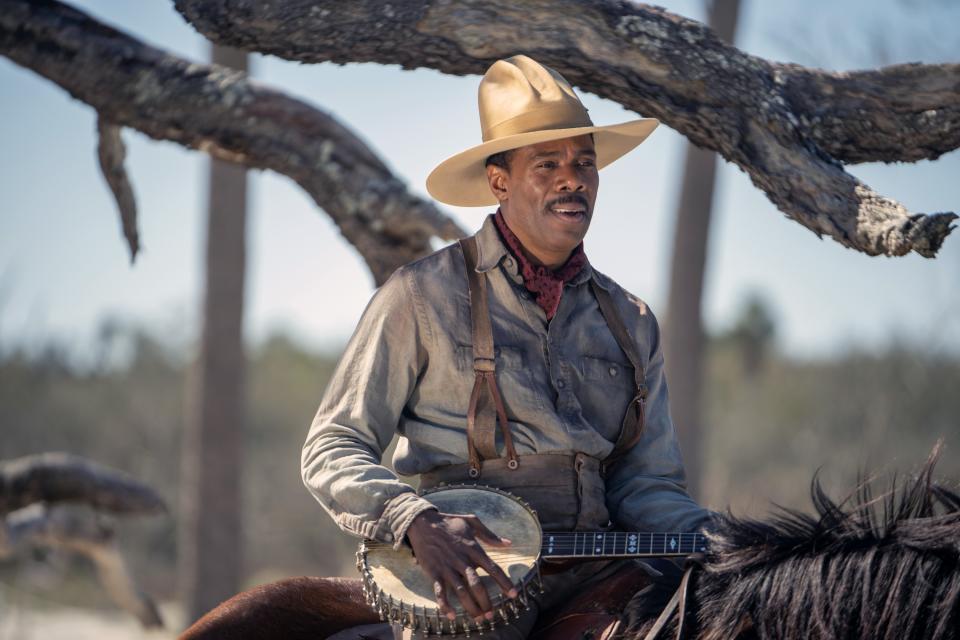
DEADLINE: And Danielle, I saw a video of when you went for callback at Julliard, and there were 40 of you and you were the only one, when you introduced yourself, who stood up, because you felt they needed to know who you are. Talk to me about that a little.
BROOKS: That’s amazing. You did do your research on that. Yeah, to be honest, I think you or I subconsciously take in moments like what Fantasia had experienced in watching her on Idol. When I saw her as a teenage girl before auditioning for Julliard, those are moments where you’re like, “I can do it too, she did it. She’s from the Carolinas, I can make it as well.” It gave me so much hope when that confetti fell down on Ms. Fantasia and she’s saying, “I believe.” I believed that was my moment to believe.
And so when I did audition for Julliard, they sat a few of us down. It was a final 40 callback. They only invited 40 out of the world, this was their final 40, they were choosing 18. And I was like, I have to make myself known. I am here. And they go around, ask you your name, where you from, and I stood up and I actually said to really make them see me, I said, “Hey, y’all,” because I’m first out. “Hey y’all, my name is Peaches.” Because I wanted them to remember me.
And I guess it was also my way of showing them like, “Hey, I’m funny. I’m humorous. Got you. I’m a good actor here.” I don’t know [sighing]. And so I did that and made it through the next call back, after showing them more of what I got, and then got accepted. But the funny part of this story is when I got into the school in the first year, I made such an impression that everyone, the students kept calling me Peaches, until I finally had to tell them my name is Danielle. That was a joke.
BARRINO: If you can give me a moment, because I think me and Danielle are going to have a lot of these moments just because we are Carolina girls, we have a lot in common. I want to say to you, Dani, every time you speak [about] Julliard and everything that I seen you in before I met you, I could see that fight in you. And as a Black, beautiful, dimpled, full-figure, curvy, beautiful girl, I’m honored to be able to stand with you. It’s almost like both of our walks are similar, but just a smidge different, but the fact that I made it on Idol and you made it at Julliard, girl from South Carolina, girl from North Carolina, and we had to fight for it.
Me and you had stories. I don’t know if you remember when we were doing our first dance rehearsal [for the movie] with a team and all the that. We all sat on the floor and we all had some dope conversations. But it was that one conversation that you and I had where we were like, “Yo, man, it’s how to fight.” And it felt like a fight. It felt like a fight. So to see me and you both here right now, I want to salute you.
BROOKS: Thank you, sis. And the same. I’m telling you, you’re part of my journey too. Getting to see you in that moment when, and to be a reflection of the same skin tone, that meant something to me. And I tried to audition for American Idol, but I think I was too young, so I didn’t make it. But yeah, I wanted to.
BARRINO: Wow. I love you, mama.
BROOKS: You too.
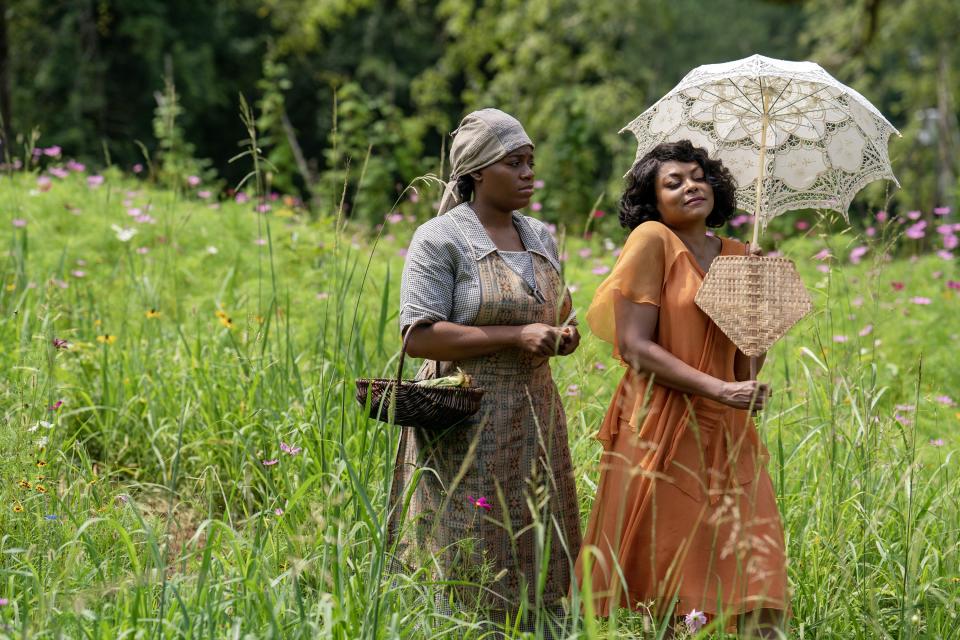
DEADLINE: You both appeared in different Broadway productions of The Color Purple. So you Fantasia, replaced LaChanze as Celie…
BARRINO: Yes. And that was hard because she was so amazing at it.
DEADLINE: And then I saw you, Danielle, a decade or so later, when you were playing opposite Cynthia Erivo. When you both heard about the movie… How did it come about, the roles? Because I know you both had to fight for them. I know that much.
BROOKS: I had been hearing about it a few years before they started to audition people. And so you’re just kind of floating it to your agents and your friends. And I even texted Scott Sanders [producer] being like, “Hey, I hear you all are making a movie.” And I just was getting crickets, really not getting much at all. And then my agents hit me up and said, Hey, Blitz, the director wants to have a meeting with you. And that’s exciting for me. I’m always like, you get me in the room to have a meeting, I’m going to get the job. It’s going to happen, but you get me going through this audition process, maybe not so much.
It’s really hard to do auditions, especially over Zoom. So I was feeling really good about this hour and a half meeting I had with Blitz. And then a few months later I heard they wanted me to go on tape to sing “Hell No”. That was the beginning stages of me checking my ego, because I was confused. I had worked with the same producers, Oprah and Scott Sanders on this, garnered a Tony nomination and won a Grammy for this, and now you want me to sing? I didn’t get in a car accident or get surgery on my lymph nodes or whatever. I’m like, what is going on? Nothing has changed. But I truly had to push my ego to the side, and I put my stuff on tape, and then didn’t hear anything for another few months.
And so I ended up writing Blitz a letter just expressing to him how much I love this character. But also that was kind of my way of surrendering to it, to say, whatever happens, I will let it be, but also, I wish this project the best. And didn’t hear anything until September. At this point, it had been six months.
That’s when Blitz asked me to do a chemistry read with Corey Hawkins who plays Harpo, which also was another swallow your pride moment because me and Corey went to Julliard together in the same class of that chosen 18. And pretty much if you do your research on us, you know we’re very tight friends. So I was just having to surrender, because at the end of the day, I knew I didn’t want to let this go. And my heart was telling me it was for me. And so I went through the process, and then two days later, that’s when Ms. O Zoomed me and told me that I had gotten the role. And it was worth the whole six months. All of the ups and downs, the valleys, the mountains, the confusion, not understanding why, it was worth all of it.
BARRINO: My story is just like Dani’s, but at first I didn’t look to take the part.
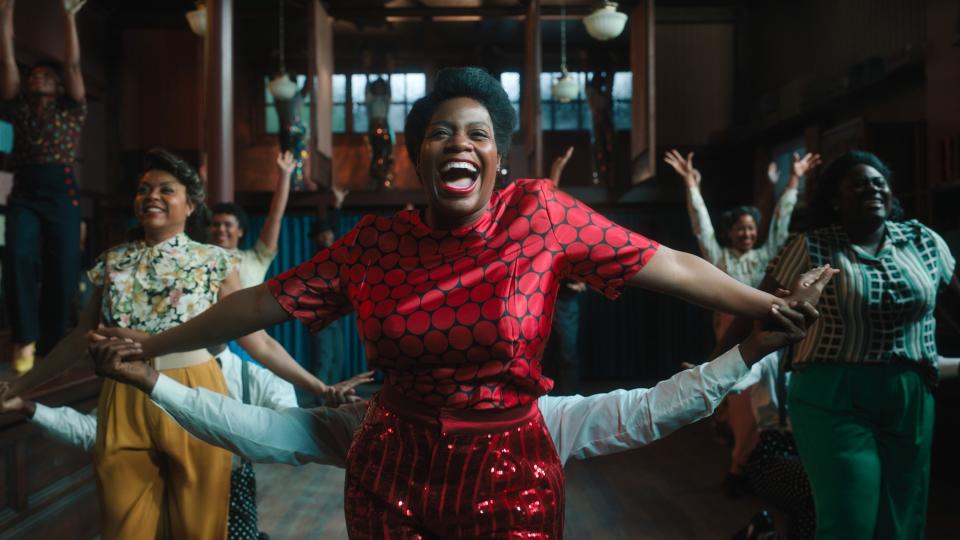
DEADLINE: Why not?
BARRINO: When I played Celie on Broadway, it was not the easiest, because at the time my life was in shambles. And so I always say I was carrying my cross and Celie’s cross, and that didn’t feel well. I would ask some of my castmates that were on stage with me, I would go around and say… And I was young. Jesus, how old was I?
DEADLINE: You were 19.
BARRINO: This was my first Broadway play. So now I’m on stage with them, and I did not know how to come out of character. No one sat me down and taught me how to come out of it, so I carried her home. There were no fingernails, lashes, makeup, beautiful hair every day. It was just Celie, Celie, Celie, Celie. And that was very taxing for me then.
I remember walking away, and I said in interviews, I said it on radio stations, I said it everywhere. I said, “I played her, but I don’t think I’ll play her again.” And I’m normally a woman that’s pretty true to my word, so when Scott called me, I was like, “Scott, didn’t you hear what I said? Because I said I would never go back.” And like Danielle said, it would’ve been crazy for me not to allow my fears to step in.
Of course, I was much older, I was in a different place, thank God to my therapist who was so dope, and I’m married now. And I just didn’t want to go back and step into her shoes and cheat her. And so Blitz called, Blitz showed me his sketches that have voices and what he was doing. He said, “I’m giving Celie an imagination.” And that’s when I was like, boom, I’m in. I felt like on Broadway, she did not have any imagination. And so all you know was Celie went through, and Celie being told she was ugly, and it gave you a Celie that was very slumped over and sad, and a poor thing. But I’m like, nah, when we’re going through stuff from where I was then to where I am now, hell, I had an imagination. I imagined myself here and I’m here. I planted that seed. So yeah, I’ll do it so that now Celie can show these girls, plant the seed, baby. I don’t care what you’re going through. You can imagine yourself in different places.
I knew it was going to be hard. Yes, it was taxing again, but I knew how to step out and I had castmates to help me and guide me… I said, one day I’m going to keep watching them and I’m going to be that, become that kind of actress where I can step into the character but not take her home, and not feel like I got to carry it that way. And so I’m there, Danielle’s going to teach me, she don’t know it yet, but…
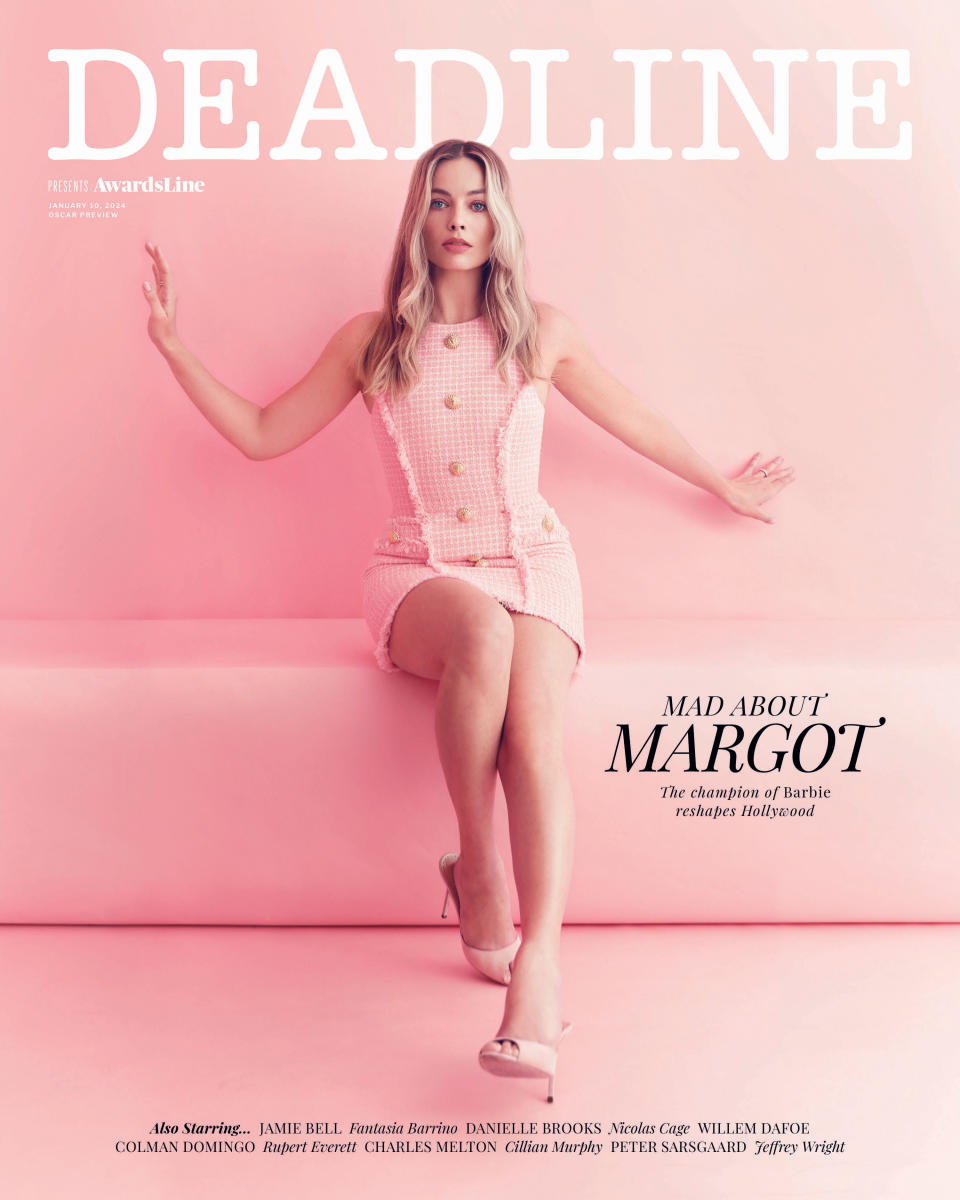
BROOKS: She’s had a long, luscious career in acting, and I cannot wait to see what she does. And I told her, I hope we get to do a project together again. Because I think I know my sister does not give herself enough credit. Baz, you already know, doing Broadway is not easy. Eight shows a week. Whether you’ve done all eight or not, it’s tough. A year of it, which we both did, is tough. That is and was her training. And not only that, Baz, excuse me, she did it twice. She did it twice, and After Midnight. She has skills. You know what I mean? She has learned so much. The learning doesn’t have to come from an educational place and an institution. And a lot of the learning, especially what I got, was learned outside of school.
I’m really, really excited about whatever movie she does next. Hopefully I’ll be right beside her.
BARRINO: And we’re going to plant that seed now, Sis.
DEADLINE: How did you both work on your characters for the screen with Blitz?
BROOKS: I think that’s the beauty of — which I don’t enjoy — but Blitz having auditioned us for so long, when he finally made his decision on his cast, he was able to fully trust us to do our thing. Because I feel like Blitz really just allowed me to fly, and not get in the way of my process too much. He trusted that I would be able to find that balance with Sofia.
Best of Deadline
2024 Premiere Dates For New & Returning Series On Broadcast, Cable & Streaming
TV Cancellations Photo Gallery: Series Ending In 2024 & Beyond
Hollywood & Media Deaths In 2024: Photo Gallery & Obituaries
Sign up for Deadline's Newsletter. For the latest news, follow us on Facebook, Twitter, and Instagram.

